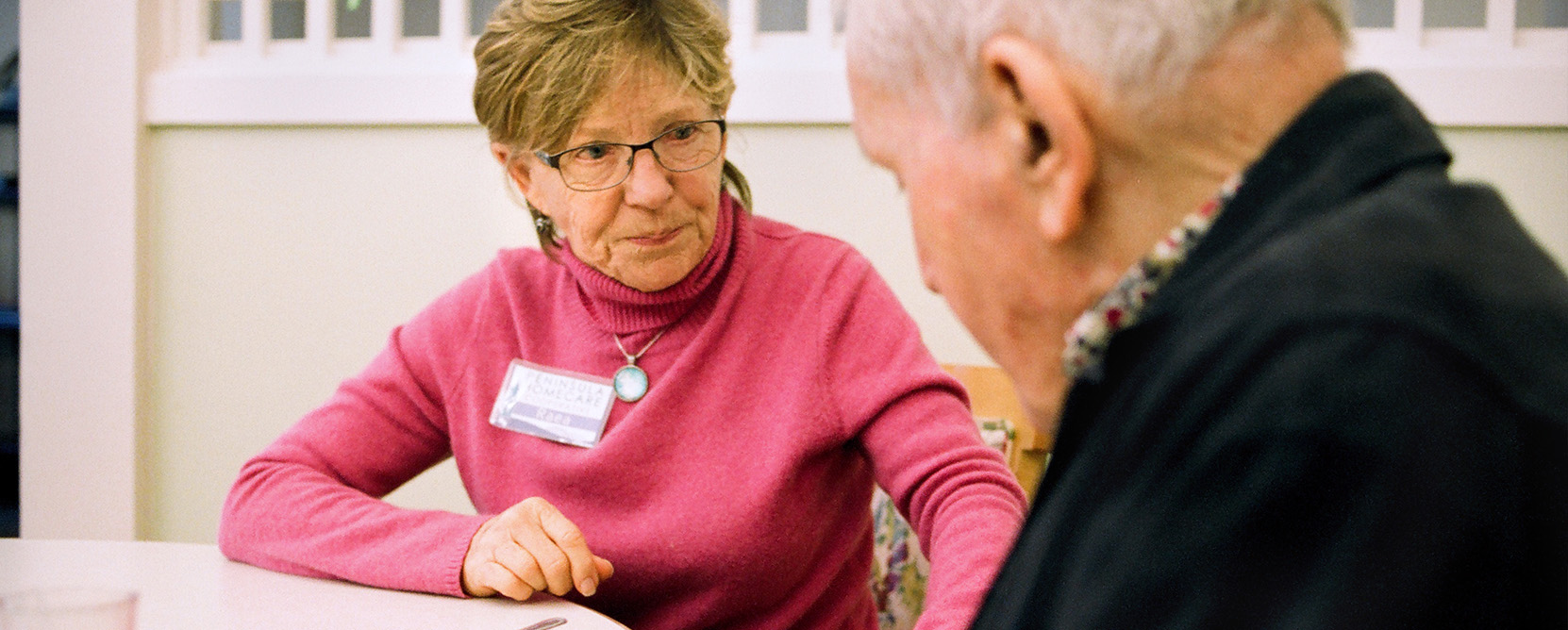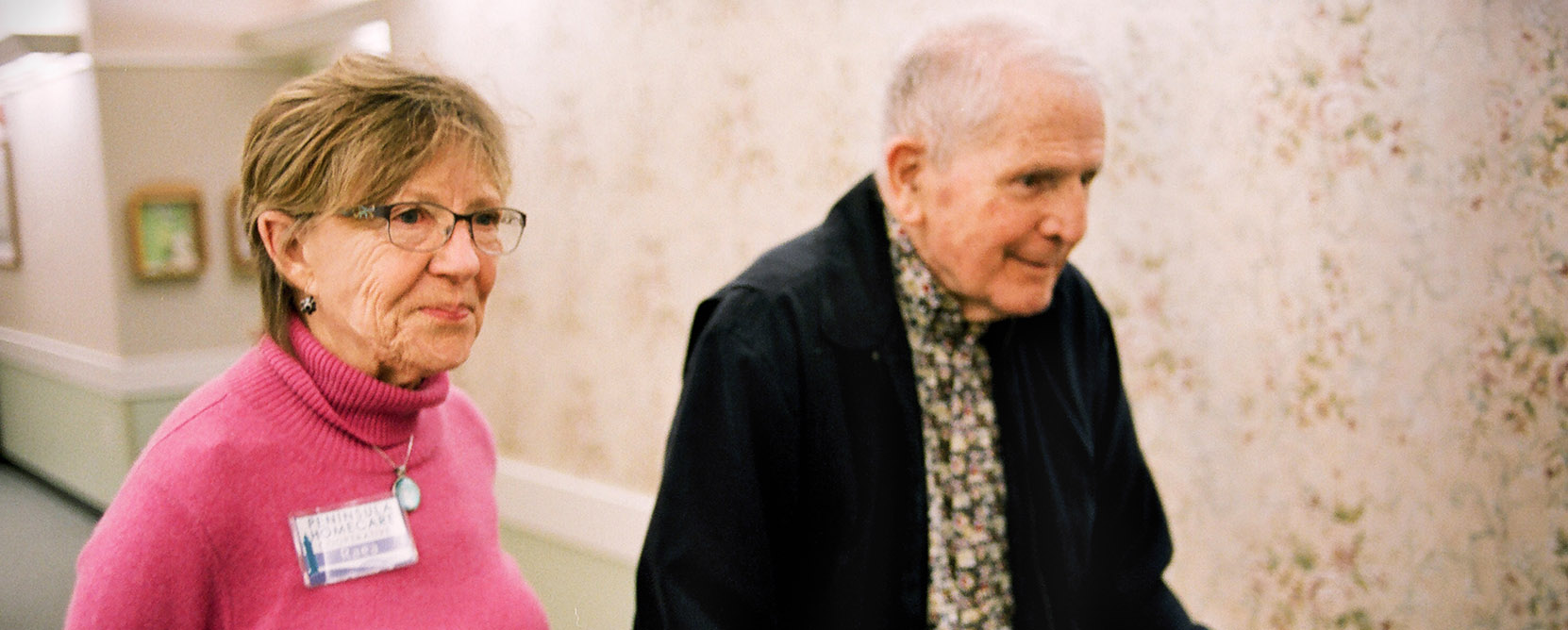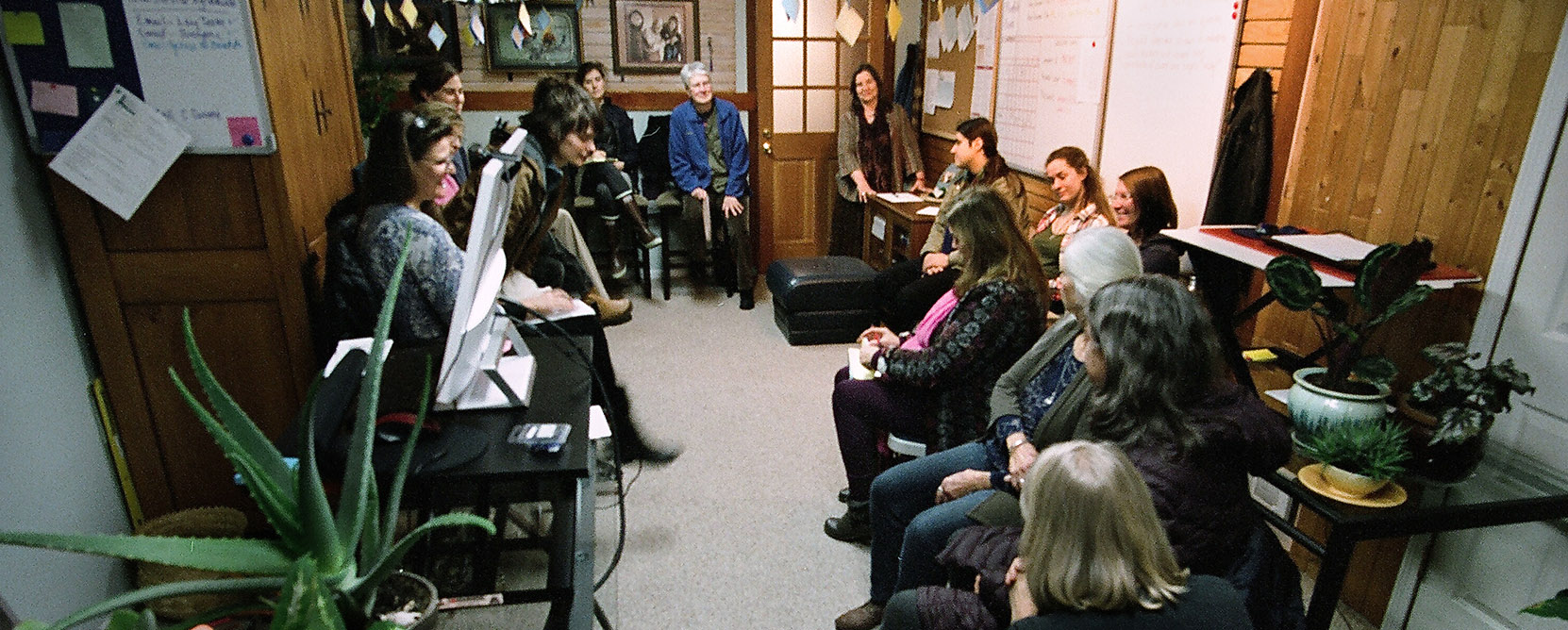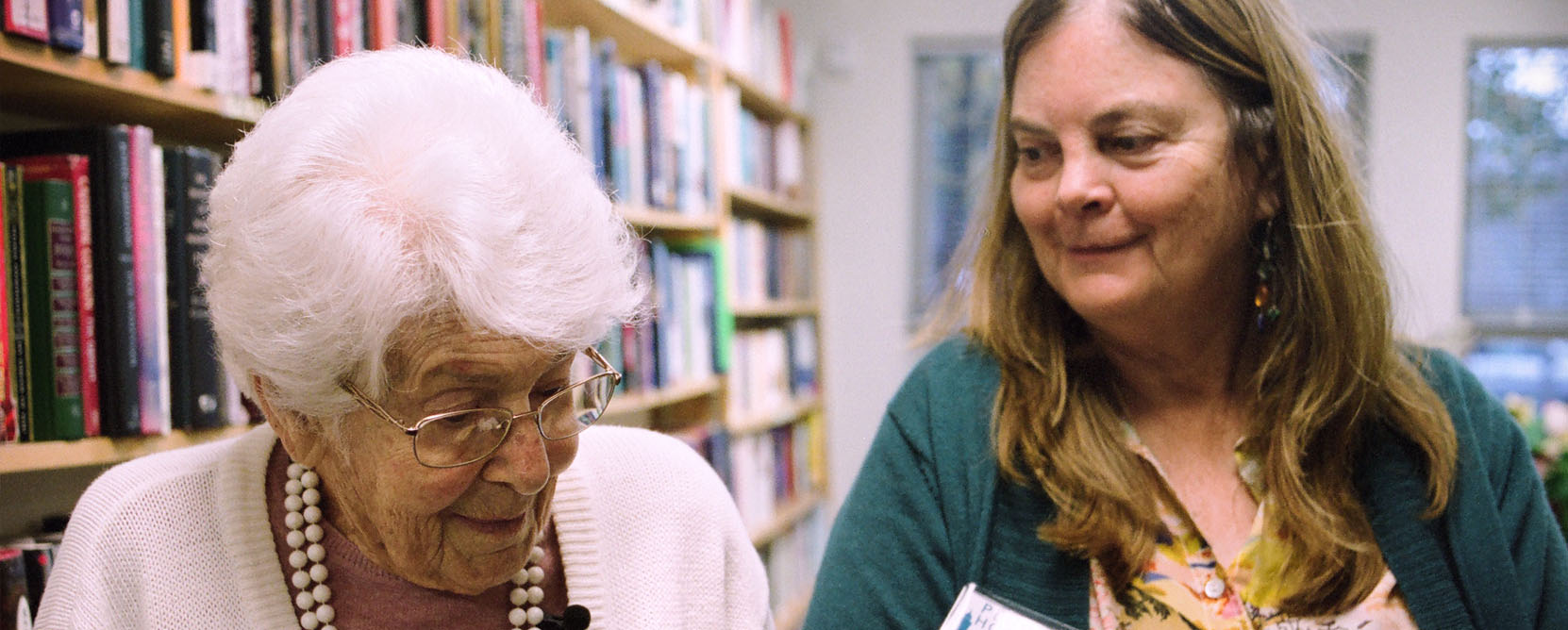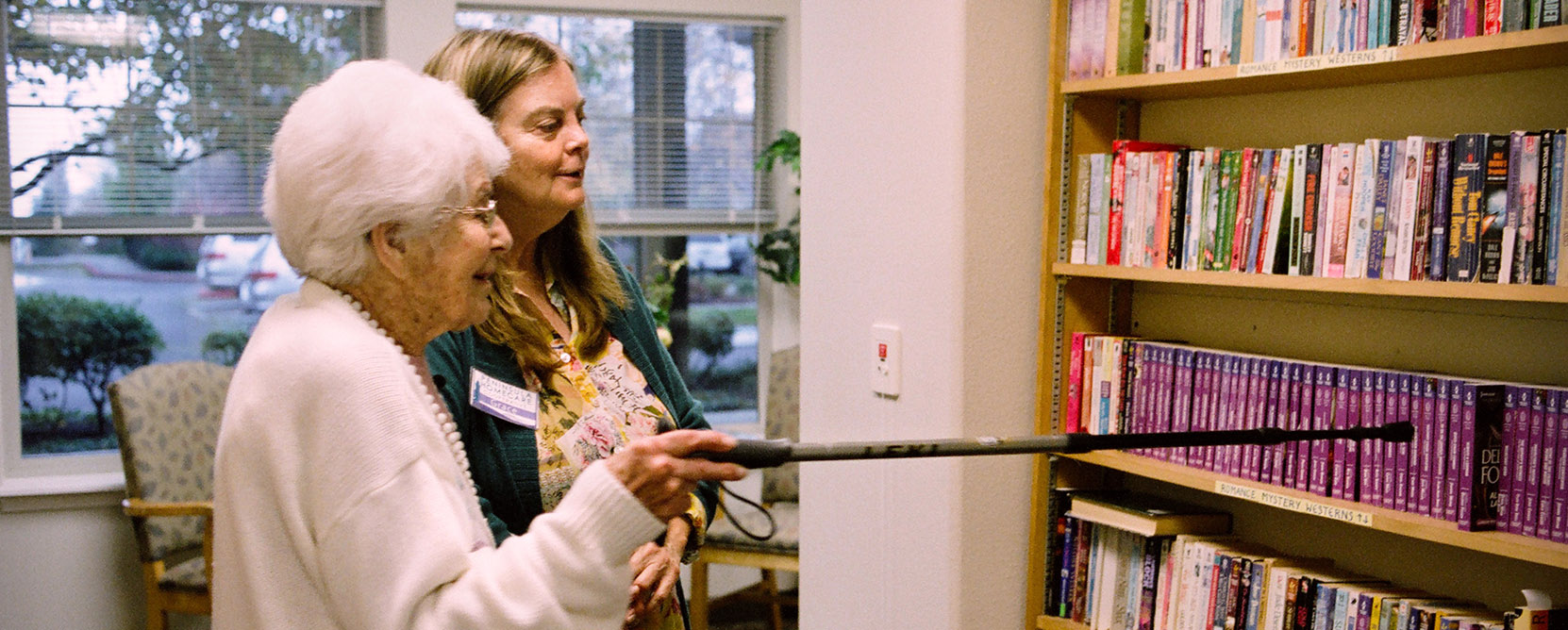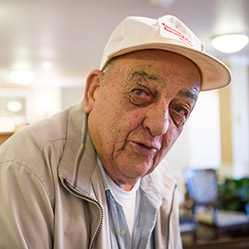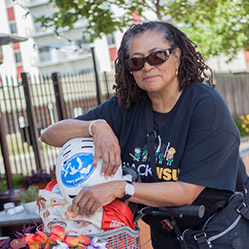
Home care aide Raea Stika bent over the bed of a woman she was caring for to lift and turn her. Unfortunately, Raea paid the price; her back ached that night and for days after.
Raea is a member of Peninsula Homecare Cooperative, a worker-owned and operated business that provides home care services for elders. The cooperative is located in Port Townsend, Washington, a small town nestled along the craggy coast of the Salish Sea, about 55 miles from Seattle. Peninsula Homecare not only takes care of elders in Jefferson County, it also takes care of older women like Raea, 75, by providing job security, a supportive work environment, and a starting hourly wage 46 percent above the national average.
Cooperatives have a long and venerable history in our country. Benjamin Franklin founded one of the first in 1752, a mutual fire insurance cooperative. For more than two centuries since, people in cities and rural communities have started agricultural, utility, consumer, worker-owned, and food co-ops, many of which still thrive today.
The appeal of cooperatives is in their democratic nature. Members share an economic stake in and control of the venture and are guided by a concern for the common welfare. There is no boss to threaten or dictate to them, and there is no boss to blame either.
Peninsula Homecare not only takes care of elders in Washington state’s Jefferson County, it also takes care of older women like Raea Stika (above), 75, by providing job security, a supportive work environment, and a starting hourly wage 46 percent above the national average.
“I loved that people were going to be co-owners of Peninsula Homecare, in charge of making it a beautiful service for all [the people] we cared for,” Raea says of joining the cooperative.
Aging baby boomers have made home care one of the fastest-growing sectors of the American economy, and that’s reflected in Jefferson County, which has the oldest median age of any county in Washington.
Raea has a master’s degree in counseling and previously worked as social worker in California before the Great Recession of 2007. She ran support groups and offered counsel to family caregivers. After the economic collapse claimed her home and business, Raea and her husband landed in Port Townsend.
“I never thought of myself as still working at this age,” she says. But when she moved, Raea couldn’t find work as a counselor. “There were no jobs here at all. And I decided, ‘OK, maybe I can do caregiving hands-on.’”
Along with about 25 other state-licensed home care cooperative members, Raea assists clients with a range of personal services. On any given day she might provide companionship, cooking, safe administration of medicines, help with showering and toilet needs, communication with family, and end-of-life care.
In turn, Raea and her Peninsula Homecare Cooperative colleagues provide each other with support, professional consultation, guidance, and respect.
When she realized she could no longer provide the care her client needed without continuing to injure herself, Raea wondered if she might lose her job. She dropped by the cooperative office to discuss her dilemma with staff and other caregivers.
“I was amazed at how supportive they were,” she says. “Here, I could have a conversation with a group of caring people and come up with a solution that would be so much better for myself and my client.”
Another co-op member stepped up to take over care of her client, and Raea soon began working with a new client who, she says, was “a better fit for me.”
After the economic collapse claimed her home and business, Raea Stika and her husband landed in Port Townsend, Washington. “I loved that people were going to be co-owners of Peninsula Homecare, in charge of making it a beautiful service for [the people] we cared for,” Raea explains about joining the cooperative.
“I worried about doing this job,” Raea says. “I said to them, ‘Are you sure you want me?’ And they said, ‘Are you kidding? We love you.’ They take care of who you are. I never feel I’m not needed — that’s huge.”
Home care is notoriously hard work. Ninety percent of professional home care workers are women, and they are among the most poorly paid workers in the United States; one in four lives below the federal poverty line. The average starting wage is $10.29 per hour.
The job is also physically demanding and calls for emotional acuity, compassion, and strong nursing and communication skills. The work requires aides to care for elders who are sometimes frightened, belligerent, severely disabled, and even sexually aggressive. Fifty-six percent of those taking care of America’s elderly and disabled residents are women of color, and a quarter are foreign born.
Kippi Waters is the driving force behind Peninsula Homecare Cooperative and one of its founding members. Waters comes from a long career as a home care and hospice aide, and she knows the job from the inside out. She now serves as the co-op’s administrator.
Kippi Waters is the driving force behind Peninsula Homecare Cooperative and one of its founding members. She was convinced that community members working together could come up with a different way of taking care of Jefferson County’s aging residents and ensure that home care workers themselves were supported and respected in their work.
Waters felt compelled to create an alternative to for-profit home care agencies for elders, and she worked with a handful of dedicated volunteers to get the enterprise off the ground. The cost of eldercare in the United States is projected to reach $400 billion in 2018, with home care services ranked as the second-largest and fastest-growing segment of the eldercare industry. The quality of service by for-profit home care agencies is compromised, Waters believes, by an imperative to return a profit to owners and investors — often people from outside the region.
Waters was convinced that community members working together could come up with a different way of taking care of Jefferson County’s aging residents.
The only way to do that, she says, was to ensure that home care workers themselves were supported and respected in their work and that their voices were heard when making decisions that impact their clients’ care and their own welfare.
Waters, a volunteer steering committee, and an elected board worked for almost a year behind the scenes before the business was launched. In the process, they received advice from the Northwest Cooperative Development Center in Olympia, Washington, and financial assistance from Cooperative Development Foundation and the U.S. Department of Agriculture, both of which provide grants to rural home care cooperatives.
“Working with the cooperative has renewed my faith in my own abilities and skills … And when we’re able to take care of ourselves, we’re obviously in a much better position to take care of our elder clients.”
— Grace Rosen, Peninsula Homecare Cooperative worker/owner
Capital Impact and its partner, the Cooperative Development Foundation, are grantees of the AARP Foundation’s Evidence-Based Solutions for Vulnerable Older Adults grant competition. Together, they are focusing on how to advance opportunities for competitive wages, quality training, and career advancement by leveraging the home care cooperative model. Capital Impact recognizes that home care cooperatives can provide more supportive conditions and greater job security for home care workers ages 50 and older, as well as for older workers returning to work after caring for a loved one.
These cooperatives offer stable job opportunities in a fast-growing industry. As part of this initiative, Capital Impact created a small stipend program for older female caregivers to offset professional training costs. Peninsula Cooperative members use the stipends to take courses and receive certification as home care aides.
“For too long, the home care industry has been characterized by low salaries, high turnover, and the labor of older female workers. That not only negatively affects these dedicated individuals but also the patients they care for,” says Candace Baldwin, director of strategic aging initiatives at Capital Impact Partners. “By encouraging the worker cooperative model — one that has proved successful for workers across many fields — we can create a way forward that delivers real social change and makes good economic sense.”
Peninsula Homecare Cooperative opened its doors for business in 2016. “They own this agency,” says Waters about the members of the cooperative. “There’s democracy in our workplace. They have a vote; they have a voice. It’s up to them. We’re very successful right now because of the level of devotion and commitment the members put into their work every day.”
In addition to their daily shifts, members attend monthly evening meetings where decisions are made about everything from client care protocols to when to pay off loans, and who to pay off first. Weekly meetings are held to talk about the challenges members face as caregivers and to exchange ideas about how best to solve on-the-job issues with clients and families.
Peninsula Homecare Cooperative members spent nearly a year learning how to run a business and studying finances, state regulations, cooperative governance, and best practices for personnel policies.
“Yes, it requires extra time,” Waters says. “It’s always a group decision, though, on how we’re going to spend our money.”
In addition to their daily shifts, members attend monthly evening meetings where decisions are made about everything from client care protocols to when to pay off loans, and who to pay off first. Weekly meetings are held to talk about the challenges they face as caregivers and to exchange ideas about how best to solve on-the-job issues with clients and families.
“We’re worker-owners; we’re responsible for strategic planning and policies,” Waters says. “We’ve had to understand our financial statements well enough to make good decisions for ourselves.
“It all takes time, but it’s worth it,” she adds. “It turns this from a job into a cooperative experience. People pick up shifts for each other when someone is sick or needs a vacation. They work overtime to keep clients safe and satisfied. This can happen when workers — many of them older women — are respected, honored, and taken care of.”
In late 2017, after five months of study and discussion, cooperative members decided to distribute business profits to themselves as dividends after paying off a loan and tucking 5 percent of their profits into an emergency fund. The dividend is based on hours worked, and it brought the average hourly wage of cooperative members to $21 — well above the national average.
After starting with Peninsula Homecare, Grace Rosen, 66, earned important health care certifications and quickly went from a starting hourly wage of $13 to $15. When Rosen collected the year-end dividend, her first year’s average earnings rose to $21 an hour.
After a career in teaching and counseling, Grace Rosen, 66, didn’t plan on going into senior care. “Why would I want to work for $10 hour?” she asks. “Eldercare is like childcare — undervalued.”
Still, she wanted to continue to be of service to others, and working with elders — given the region’s aging population — was an obvious prospect. She knew she “wasn’t corporate material,” and she wanted to work for an organization that fostered “collaboration, cooperation, and co-creation.”
After reading about Peninsula Homecare Cooperative, Rosen went to talk with the co-op’s staff about the possibilities of working with them. Kippi Waters saw Rosen’s promise and recommended hiring her.
A stipend from Capital Impact, in partnership with the Cooperative Development Foundation, enabled Rosen to earn certification as a professional health care aide, and she went on to earn her nurse delegation certification as well. Rosen quickly went from a starting hourly wage of $13 to $15 an hour — now a standard starting wage for new cooperative members. When she collected the year-end dividend, her first year’s average earnings rose to $21 an hour.
“There’s democracy in our workplace. They have a vote; they have a voice. It’s up to them. We’re very successful right now because of the level of devotion and commitment the members put into their work every day.”
– Kippi Waters, Peninsula Homecare Cooperative Founding Member
“The cooperative provides long-term security for me and is meeting such a vital community need,” says Rosen. “I don’t need to be rich, but to go out for a slice of pie or buy a new outfit once in a while, that’s nice. We’re moving toward a livable wage now. I don’t worry as much.”
The opportunity to collaborate with others in her new career is a bonus. “As a co-owner, this is my business, too,” she says. “It’s a challenge, sure, to be a caregiver by day and a member of a co-op with its additional responsibilities. It requires that you have generosity of spirit to invest.”
Rosen envisions providing hands-on care to clients for another five years, and then she’d like to transition into training newcomers to the field.
“My hair is gray; I’m becoming a crone in this society,” she says. “Working with the cooperative has renewed my faith in my own abilities and skills.”
“The cooperative provides long-term security for me and is meeting such a vital community need,” says Rosen. “I don’t need to be rich, but to go out for a slice of pie or buy a new outfit once in a while, that’s nice. We’re moving toward a livable wage now. I don’t worry as much.”
Waters says the cooperative has enabled older women to support themselves comfortably and to live a dignified life. “And when we’re able to take care of ourselves,” she says, “we’re obviously in a much better position to take care of our elder clients.”
She suggests that those who are interested in starting a home care cooperative familiarize themselves with state laws that govern home care certification and practices. They also should confer with regional and national organizations that support cooperative ventures, particularly cooperatives of home care workers.
“We’re running a business, and in our town, that means we’re running a medium-sized business,” Waters says. “We don’t have anything coming down from above. We have to step up, and it’s a great joy to step up. I’ll do anything to make sure we succeed.”
LEARN MORE ABOUT OUR WORK
